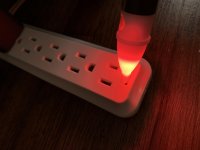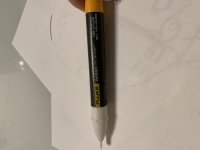I just restored a dynaco st-70, original PCB.
I notice there is noticeable 120Hz hum. If I remove the input rca cable, the hum is gone. The dynaco st-70 should be ok. I never used an amp with 470k input impedance like the st-70 has. The source is a modern AV receiver’s preamp-out. Both receiver and the st-70 have 2 prong power cords. Thus, there is no ground loop. I tried to tie a ground wire between their chassis. It did improve a little bit, but the hum was still noticeable. I am probably going to add a 10k resistor paralleling with 470k in st-70 if I cannot find a good solution.
BTW, my speakers have 92dB sensitive.
Any suggestions to deal with high impedance input noise issue?
Thanks!
I notice there is noticeable 120Hz hum. If I remove the input rca cable, the hum is gone. The dynaco st-70 should be ok. I never used an amp with 470k input impedance like the st-70 has. The source is a modern AV receiver’s preamp-out. Both receiver and the st-70 have 2 prong power cords. Thus, there is no ground loop. I tried to tie a ground wire between their chassis. It did improve a little bit, but the hum was still noticeable. I am probably going to add a 10k resistor paralleling with 470k in st-70 if I cannot find a good solution.
BTW, my speakers have 92dB sensitive.
Any suggestions to deal with high impedance input noise issue?
Thanks!
Last edited:
You already statued that removing the rca wire will silence the st70. ThusI just restored a dynaco st-70, original PCB.
I notice there is noticeable 120Hz hum. If I remove the input rca cable, the hum is gone. The dynaco st-70 should be ok. I never used an amp with 470k input impedance like the st-70 has. The source is a modern AV receiver’s preamp-out. Both receiver and the st-70 have 2 prong power cords. Thus, there is no ground loop. I tried to tie a ground wire between their chassis. It did improve a little bit, but the hum was still noticeable. I am probably going to add a 10k resistor paralleling with 470k in st-70 if I cannot find a good solution.
BTW, my speakers have 92dB sensitive.
Any suggestions to deal with high impedance input noise issue?
Thanks!
the hum comed from the interconnection or preamp.
You might have a ground current flowing. A better wire firmly connected between the tvo chassies will keep ground currents away. 3-prong outlets on both would also be beneficial.
When connected to the modern AV receiver’s output the ST-70 "sees" about 100 Ohms. So the 470k is irrelevant.
2-pin plugs: can you turn one over? (New USA stuff has different size pins, but original ST-70 had equal pins.)
2-pin plugs: can you turn one over? (New USA stuff has different size pins, but original ST-70 had equal pins.)
Do the two RCA ground shells touch at the front of the ST70?
Are there still two 10R resistors between the input jacks and the driver board?
Are there still two 10R resistors between the input jacks and the driver board?
Should be tested with another signal source , ST70 doesn't have volume pot so it is ( much ) more sensitive to hum .
Last edited:
Unearthed systems are dangerous, you need to earth both units for your safety, certainly the ST70 (the AV receiver may be double-insulated?). The original design of the ST70 is a death-trap with its floating chassis, unacceptable.
I just restored a dynaco st-70, original PCB.
I notice there is noticeable 120Hz hum. If I remove the input rca cable, the hum is gone. The dynaco st-70 should be ok. I never used an amp with 470k input impedance like the st-70 has. The source is a modern AV receiver’s preamp-out. Both receiver and the st-70 have 2 prong power cords. Thus, there is no ground loop. I tried to tie a ground wire between their chassis. It did improve a little bit, but the hum was still noticeable. I am probably going to add a 10k resistor paralleling with 470k in st-70 if I cannot find a good solution.
BTW, my speakers have 92dB sensitive.
Any suggestions to deal with high impedance input noise issue?
Thanks!
I was recently troubleshooting similar issue, slight buzz on output. Irrelevant of volume pot settings.
I solved the problem by adding one more volume pot on the output, which is now master volume control.
Input volume pot sets the sensitivity (and overdrive if i feel like it).
Do the two RCA ground shells touch at the front of the ST70?
Are there still two 10R resistors between the input jacks and the driver board?
Yes, the 2 10ohm resistors are on the PCB. I did not bypass those.
Then the noise is less likely to be a ground loop.
Do you have any other amplifiers or preamps to try?
Plug the components into the same outlet or power strip,
and try reversing each plug in its socket.
Do you have any other amplifiers or preamps to try?
Plug the components into the same outlet or power strip,
and try reversing each plug in its socket.
Last edited:
Unearthed systems are dangerous, you need to earth both units for your safety, certainly the ST70 (the AV receiver may be double-insulated?). The original design of the ST70 is a death-trap with its floating chassis, unacceptable.
You probably are correct. Probably I will change it to 3 prong cord.
Side story, I don’t trust the ground coming out of my house wall, which is built in 1960s. My computer’s UPS reports “Faulty Wiring” on those outlets.
Then the noise is less likely to be a ground loop.
Do you have any other amplifiers or preamps to try?
Plug the components into the same outlet or power strip,
and try reversing each plug in its socket.
As long as I put a rca cable on it, and it does not have to connect to the source, it hums. Could the hum wirelessly coupled?
That was the best rca cable that I have, it is designed for digital or video purpose.
How about shorting plugs in both sockets, is there hum then?
You could have strong fields, this would not be unusual.
Try turning off computers, etc. to reduce noise generators.
You could have strong fields, this would not be unusual.
Try turning off computers, etc. to reduce noise generators.
Last edited:
It hums with rca cable because without input volume pot is allways at "maximum" . That's why any noise , hum from the source is not divided by the volume pot as you would listen at normal level ( pot at 15% or so ) . For this amplifier the signal source must be very well made . And cables of course .
Last edited:
Yes, the cable is an antenna.As long as I put a rca cable on it, and it does not have to connect to the source, it hums. Could the hum wirelessly coupled?
Unearthed systems are dangerous, you need to earth both units for your safety,
You probably are correct. Probably I will change it to 3 prong cord.
Side story, I don’t trust the ground coming out of my house wall, which is built in 1960s. My computer’s UPS reports “Faulty Wiring” on those outlets.
All sounds safe and legit ............🙄
Why not do some tests on the house earth ?, or get someone in.
Can we put that on your grave stone "I probably should have sorted that protective earth"
Last edited:
If you ground the ST70 chassies to ground, then i suppose the hum will be reduced in the above scenario.As long as I put a rca cable on it, and it does not have to connect to the source, it hums. Could the hum wirelessly coupled?
That was the best rca cable that I have, it is designed for digital or video purpose.
Hum problems usually benefits from grounded equipment.
A comment : if anything is connected to a cable-tv or cable-radio antenna you could have a ground loop through them. Disconnect the cable to confirm. If so,
you can buy a "ground-separator" and use on the cable-tv/radio.
I guess the ground for living room section is open. Other rooms are ok.
Well that's alright then 😛

Ok, back to the hum problem. A thread in other forum mentioned to short the 10 ohm resistors at the input. I did that and the hum was down quite a bit, but it was still there.
I oscilloscope the output. The hum is about 10mVpp, mainly 60Hz, also see 120Hz components. Based on my calculations, the SNR is only about 60dB to 70dB in my case. On the manual, the SNR should be 90dB down.
I oscilloscope the output. The hum is about 10mVpp, mainly 60Hz, also see 120Hz components. Based on my calculations, the SNR is only about 60dB to 70dB in my case. On the manual, the SNR should be 90dB down.
You probably are correct. Probably I will change it to 3 prong cord.
Side story, I don’t trust the ground coming out of my house wall, which is built in 1960s. My computer’s UPS reports “Faulty Wiring” on those outlets.
They probably have Hot and neutral reversed. The narrow slot to the ground pin should read 120V.
- Home
- Amplifiers
- Tubes / Valves
- Input impedance vs hum/buzz

